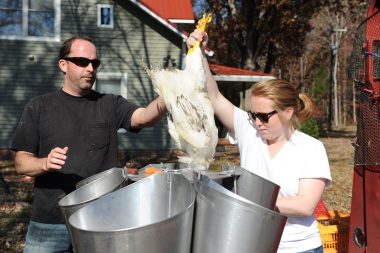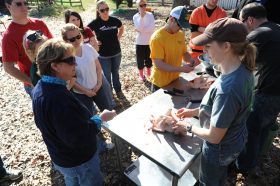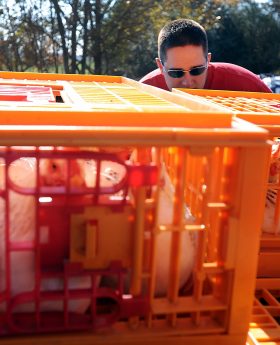When it comes to engaged learning, students in the fall semester public administration senior seminar on food and agriculture public policies learned that it doesn’t get any more hands-on than processing chickens themselves, from the final clucks to the customer sales on a small Orange County organic farm.

Led by associate professor Betty Morgan, the seminar introduces students to the complex system of public policies that shape how food is grown, raised, slaughtered, processed, inspected and delivered from the field to the dinner table in the United States. Part of that learning process has included trips to local farms.
By noontime on the Saturday before Thanksgiving, students in Morgan’s course had traveled half an hour from campus to a small Mebane livestock farm. Their purpose? To see how small farms can thrive by humanely raising and processing livestock for purchase by local consumers.
“My aspiration for this class was to make sure students understand that our public policy choices have so conditioned agriculture and food practices that we are now living in a world artificially contrived and so controlled by agricultural conglomerates and lobbyists that we don’t have much freedom to make good health choices anymore,” Morgan said. “The system makes it so difficult for us to get accurate information, that doing so is nearly impossible. Rather than leaving students on this grim note, what I set out to do was show them that we do have options that don’t paint us into this corner.”
Farm co-owner Suzanne Nelson met the group in the gravel driveway to the farm off Lloydtown Road. As Nelson led the class on a tour to various plots where goats, chickens, pigs and cows grazed, her husband and farm co-owner, Corey Landry, quickly set up the poultry processing area: Metal funnels over a drip pan on the ground, a tank with 160 degree water, a plastic centrifuge container with rubber fingers and water jets, and a stainless steel table with knives.
Once the class returned from its tour, processing the birds began. Landry pulled a chicken from a nearby bright yellow crate, held it steady to protect against the flapping wings, then placed it headfirst into a funnel that opened downward toward the drip pan at the bottom of the rig. The chicken’s head popped out the bottom and moved from side to side.

Landry, who works full time for Credit Suisse during the week, picked up a nearby knife. He explained to the students surrounding the station that chickens need to be bled, and the most humane way of killing them was to slice the caratoid arteries on either side of its head. The birds grow lightheaded and die within moments.
Seconds later, the chicken stopped moving. Two more birds followed in other funnels hanging above the drip pan. Landry then attached the birds by their feet to a dipping pole over the adjacent hot water tank. Several dunks into the bath, followed by a vibrating centrifuge with water jets, removed the birds’ feathers.
On the processing table, Nelson demonstrated proper handling techniques, instructed students on safety and hygiene issues, and after a poultry anatomy lesson made quick use of various knives to clean the birds for sale.
The group initially watched in fascination. Within a short time, students joined the process. Several picked up the knives as more birds found their way to the metal funnels. Dispatching a chicken was not required, though some students noted a philosophical point about their experience. “My attitude that I’ve gained toward food is that if you can kill it, you have the right to eat it,” said Elon senior Adley Kloth. “If you can’t kill it you don’t have that right. If I’m in front of this chicken and decide that I just can’t kill any animals I would normally eat for food, I shouldn’t eat it.”

Senior Becky Mitchell takes an opposite approach. Since enrolling in the course, she has changed her lifestyle, removing meats from her diet and explaining to her husband and children why previously served dishes are no longer available in their home. Mitchell’s 8-year-old son and 6-year-old daughter took the move in stride.
“Since they’ve been young, I’ve explained to them in an adult way the reasons for what we do,” said Mitchell, recounting her daughter’s reaction to learning about the fate of farm animals meant for market. “She cried. I’d never said what happens at farms, and she had never made that connection.”
To be sure, the chicken processing was only a small part of the seminar, which Morgan taught for the first time this fall after noticing the disparate treatment in the way food is grown and marketed overseas compared to how it’s sold and consumed in the United States. The course has explored a range of public policies pertinent to food and agriculture and has focused on the November 2010 passage of the first substantive federal food safety regulation legislation in 73 years.
In addition, students have explored labor policies related to farming and agriculture, farm safety and health regulations and regulatory funding in addition to health and nutrition issues.
Morgan said she will always teach the class, with plans underway to expand its syllabus this spring. That would sit just well with students who have lauded the inaugural seminar.
“I’ve never before asked what’s on my plate and where it came from,” said Elon senior Jackie Seisman. “The most important component of this class is asking questions about why things are the way they are.
“I don’t think a course has ever changed or motivated me in this way. It’s absolutely changed the way I eat, how I live, and my views on public health issues.”
Seniors will present their research on Dec. 13 at 1 p.m. in Carlton 209. Members of the campus community are invited to hear what they’ve learned during the semester.


